|
|
|
Sort Order |
|
|
|
Items / Page
|
|
|
|
|
|
|
| Srl | Item |
| 1 |
ID:
193550
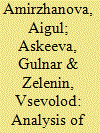

|
|
|
|
|
| Summary/Abstract |
This study conducts a comparative analysis of Ukraine and the Republic of Kazakhstan, two post-Soviet states facing ongoing contradictions and challenges in mutual understanding. Following the collapse of the Soviet Union, these states embarked on their own paths of national development, influenced by various political, economic, socio-cultural, and ethnic factors. This study examines the formation of political parties, the development of political and electoral culture, and the legal approaches to organizing the electoral process in Ukraine and Kazakhstan. Additionally, it explores the manipulation of electoral behavior through a specific case study. The study employs standard political research methods such as comparative analysis, anthropological and structural-functional approaches, content analysis, and a systematic approach. The findings of this study serve as valuable information for experts involved in organizing electoral processes, researchers in comparative political science, and readers interested in the subject matter.
|
|
|
|
|
|
|
|
|
|
|
|
|
|
|
|
| 2 |
ID:
193547
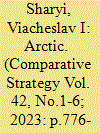

|
|
|
|
|
| Summary/Abstract |
This article defines the Arctic as a political arena and examines the interests and plans of several countries regarding its territory and resources, namely, Canada, Russia, the United States, Norway, Denmark, Iceland, Sweden and Finland. The article highlights the Arctic region’s advantages, emphasizing the priorities of each state to establish control over this territory. The Arctic region is beneficial for the development of economic activity and the protection of the territories of coastal countries, has a significant number of deposits of natural resources and other minerals, and significant transit opportunities. The Arctic region has become a subject of intense interest within the international community. There is a need to strike a balance between economic interests and environmental protection should guide diplomatic efforts to secure the sustainable development of the Arctic region for the benefit of all stakeholders.
|
|
|
|
|
|
|
|
|
|
|
|
|
|
|
|
| 3 |
ID:
193515
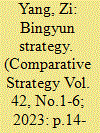

|
|
|
|
|
| Summary/Abstract |
This article explores the evolution and application of the Chinese Communist Party’s (CCP) bingyun strategy pre-1949. Developed by Chinese and Soviet thinkers, bingyun or “Soldier Movement” aimed to subvert opposing armed forces to either bring them under CCP command or cause them to self-destruct. The bingyun strategy was practiced throughout the revolutionary period with lasting legacy in present-day China. By examining cases from the First Kuomintang-CCP United Front, First Phase of the Chinese Civil War, Sino-Japanese War and the Second Phase of the Chinese Civil War, this article demonstrates how bingyun adapted to changing circumstances and its far-reaching consequences for CCP military success that realized its takeover of China in 1949.
|
|
|
|
|
|
|
|
|
|
|
|
|
|
|
|
| 4 |
ID:
193524


|
|
|
|
|
| Summary/Abstract |
Everyone knows there is a climate crisis at hand and that humankind is to blame. Drastic measures are needed now to arrest human-induced climate change from greenhouse gas emissions. Or maybe not. The first part of this article will show that prevailing narratives and public perceptions of climate change are distorted by a series of exaggerations. The second part of the article examines efforts to link climate change to US national security. And the final part of the article explains why current climate policies pose a greater threat to US national security than the climate does.
|
|
|
|
|
|
|
|
|
|
|
|
|
|
|
|
| 5 |
ID:
193538


|
|
|
|
|
| Summary/Abstract |
This article examines the role of strategy in proxy wars, with the goal of identifying relevant findings to proxy wars. Comparatively analyzing Russia and the U.S.’s proxy strategies in the Russo-Ukrainian War is useful to this end – four major findings emerge. First, a state’s proxy strategy is dependent on variables unique to that state, and those of the available proxy. Second, proxies – the actual individuals or groups – are not singular in their characteristics. A proxy’s uniqueness contributes to the range of options it provides its principal. Third, proxy strategies are not fixed. The range of proxy strategy options available to a state reflects the combined uniqueness of the principal and the proxy. Lastly, in proxy wars, concerns of conflict escalation might be a thing of the past. These points make an additive contribution to both strategic and proxy war scholarship by providing a useful examination of comparative proxy strategies.
|
|
|
|
|
|
|
|
|
|
|
|
|
|
|
|
| 6 |
ID:
193519


|
|
|
|
|
| Summary/Abstract |
Scholars of Strategic Studies have seldom problematized the concept of military strategy beyond identifying the three elements constituting the phenomenon, that is ends, means and ways. Moreover, we see a need for contextualizing the presumably universal conceptualization of military strategy. This article contributes to previous research by operationalize each of the three elements one-step further, thereby introducing an analytical framework for systematic comparisons of states’ different priorities regarding military strategy. Additionally, in order to explain these different priorities, the proposed analytical framework introduces tools related to both relative power and position in the international system, and to regional systems and unit-level characteristics. The usefulness of the analytical framework is illustrated by a summary of some of our findings from a research project on comparative strategy including more than 30 states.
|
|
|
|
|
|
|
|
|
|
|
|
|
|
|
|
| 7 |
ID:
193537


|
|
|
|
|
| Summary/Abstract |
This article contributes to the discussion of the relationship between the border factor and geopolitics in the post-Soviet area and strives to identify the drivers and obstacles in the sphere of territorial integration between Kazakhstan and Russia. The aim of the article is to characterize the geopolitical landscape of thses countries and to reveal the ambivalent context of Kazakhstan’s cooperation with regions across Russian-Kazakhstani border proceeding from the analysis of the interests of key players in Central Asia and the current status of the cross-border cooperation between two countries.
|
|
|
|
|
|
|
|
|
|
|
|
|
|
|
|
| 8 |
ID:
193521
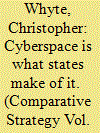

|
|
|
|
|
| Summary/Abstract |
Why do some strategic concepts come to dominate over alternative, often-entrenched views of warfighting? And what determines the staying power and proneness to change over time of the prevailing vision? Focusing on cyberspace, I describe the Internet as an artifact interpreted differently by competing interest groups. I show that reconciliation of these interpretations comes from individuals with the position and motivation to make technology work for a specific vision of use and spread that vision to other parts of the organization. By tracing the role of such key network nodes in the evolution of strategic concepts, I show that information technologies themselves act to break down barriers to engagement between social sub-elements of complex organization, making the whole susceptible to narrow parochial change. Moreover, I illustrate how the cyberspace concept is both impermanent and an attempt at problem redefinition leading to an ill-fitting lens, rather than simply a rhetorical-institutional reorientation.
|
|
|
|
|
|
|
|
|
|
|
|
|
|
|
|
| 9 |
ID:
193530


|
|
|
| 10 |
ID:
193544
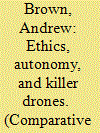

|
|
|
|
|
| Summary/Abstract |
As technology advances, machines will increasingly serve as moral arbiters of difficult and convoluted war tasks. Humanity is already in the dawn of the “Autonomous Revolution” and ethical questions and considerations regarding the use of artificial intelligence (AI) in war cannot be delayed. The use of AI-enabled weaponized drones is a microcosm of the issues that arise. The purpose of this paper is to create and sustain a discussion of the ethics of emerging defense technologies by considering them in the context of mainstream ethical frameworks, analyzing the U.S.’s decision-making and moral justifications to date, and discussing what ethics should be instilled in AI-enabled military drones themselves, if indeed the U.S. decides to further pursue them.
|
|
|
|
|
|
|
|
|
|
|
|
|
|
|
|
| 11 |
ID:
193549
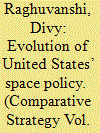

|
|
|
|
|
| Summary/Abstract |
United States space policy has largely reflected the outlook of a major power. The key distinguishing feature of such a state is their willingness to proactively reshape and engage with international regimes and organizations. They do this to protect their strategic goals and national interest. US space policy has historically been shaped by geopolitical tensions and rivalries. Its space policy is an extension of the military doctrines and strategies that it subsequently developed. The article examines different periods since the start of the space race. These periods reflect how US space policy has adapted to meet new challenges.
|
|
|
|
|
|
|
|
|
|
|
|
|
|
|
|
| 12 |
ID:
193527


|
|
|
|
|
| Summary/Abstract |
This article seeks to theorize the transformation of the armed forces in Northern Europe by examining its drivers during previous NATO enlargements in the region. The exploration includes the German reunification in 1990, the Polish entry in 1999, and the joining of the three Baltic States, i.e., Estonia, Latvia, and Lithuania, in 2004. Based on these experiences, the article identifies some theoretical considerations for transformation in conjunction with the current accession process of Finland and Sweden. Based on a realist logic, we conclude that the ongoing transformation should be underpinned by a new operational design, hence considering the need for flexibility and for managing potential new expeditionary shocks. To this end, we argue that the focus must initially be internally within the Alliance, i.e., to proceed with novel operational planning for northern Europe before turning the attention to the transformation of the armed forces of the new members.
|
|
|
|
|
|
|
|
|
|
|
|
|
|
|
|
| 13 |
ID:
193548


|
|
|
|
|
| Summary/Abstract |
The national security realm poses great challenges to senior military officers and civilian officials. These leaders oftentimes attend designated Joint Professional Military Education (JPME) institutions as a prerequisite for their futrue appointments. The article examines how these colleges and universities instill in their graduates the intellectual capacity to effectively engage and solve macro-level and acute strategic challenges as well as employ critical thinking skills to ensure intellectual agility and flexibility. The article compares the Israel National Defense College (INDC) and the National Defense University (NDU) to identify the differences and similarities between the two institutions and explain what it says about the Israeli and the American strategic culture and approach to the future of national security.
|
|
|
|
|
|
|
|
|
|
|
|
|
|
|
|
| 14 |
ID:
193542
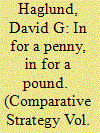

|
|
|
|
|
| Summary/Abstract |
Over the past couple of decades, students of American grand strategy have debated the merits (or lack thereof) of an orientation toward the global balance of power that has come to be known as “offshore balancing.” Its critics hold offshore balancing simply to be another way of expressing the dangerous allure of strategic “restraint,” or even “isolationism.” Its enthusiasts, by contrast, see in it nothing other than the best conceivable grand strategy for America, enabling Washington to avoid the pitfalls of either too little or too much interventionism in global affairs. This article challenges both positions, and argues that the historical record of offshore balancing as an American strategic orientation leads to the conclusion that, far from being a crypto-isolationist grand strategy, it actually betrays close affinities with the so-called “maximalism” to which its champions believe it to be superior.
|
|
|
|
|
|
|
|
|
|
|
|
|
|
|
|
| 15 |
ID:
193546
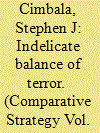

|
|
|
|
|
| Summary/Abstract |
Albert Wohlstetter’s seminal essay of the early Cold War years, “The Delicate Balance of Terror,” calls for revisiting in the current climate of geopolitics and military technology. The possible emergence of China as a near peer competitor with the United States and Russia in strategic nuclear forces changes the dynamics of nuclear deterrence, arms control and strategic stability in Asia and globally. In addition, future deterrence stability will also be challenged by changes in technology, including hypersonic weapons, improved missile defense capabilities, competition in the cyber and space domains, and the uncertain impacts of game changers such as artificial intelligence and nanotechnology. As well, containment of nuclear weapons spread cannot be guaranteed, given the dissatisfaction of some existing and aspiring nuclear weapons states with the present international order.
|
|
|
|
|
|
|
|
|
|
|
|
|
|
|
|
| 16 |
ID:
193522
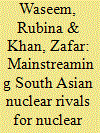

|
|
|
|
|
| Summary/Abstract |
There is a need for mainstreaming South Asian Non-NPT Nuclear Weapon States. India is an emerging market and Pakistan has the potential to become a future market for nuclear energy. Furthermore, they have nuclear weapons, making it important to take them on board in the Nuclear Nonproliferation Regime (NPR). Given the reality that they are not ready to roll back their nuclear program, there is a need to explore options for mainstreaming them especially in nuclear export control mechanisms. This article investigates the policy imperatives for the international community to address the South Asian Non-NPT-NWSs in the NSG.
|
|
|
|
|
|
|
|
|
|
|
|
|
|
|
|
| 17 |
ID:
193533
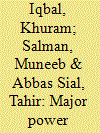

|
|
|
|
|
| Summary/Abstract |
Written military doctrines are generally seen as declaration of intent and strategic objectives by military forces. Pakistan has typically stayed averse to the trend of formal military doctrines owing to its strategic culture. However, in a first precedent Pakistan Navy released a formal military service doctrine in 2018. Yet it remained short of being a truly comprehensive formal naval doctrine. This article explores the naval doctrinal developments in Pakistan since the end of last century, its relationship with the ensuing major power competition in the Indian Ocean region, and its possible implications on doctrinal development in Pakistan.
|
|
|
|
|
|
|
|
|
|
|
|
|
|
|
|
| 18 |
ID:
193551


|
|
|
|
|
| Summary/Abstract |
This article analyses the modalities of China’s combinatory unrestricted warfare. After an investigation of the founding principles of Chinese military thought, the second part of the article is dedicated to the importance of technology in modern warfare and more specifically what Chinese military thinkers called “informatization,” which enables a combinatory unrestricted warfare strategy. Through a geopolitical analysis, the last part of this article specifies the modalities of Chinese combinatory unrestricted warfare applied to China’s security concerns: ensuring Chinese economic development and the preservation of China’s territoriality, including Taiwan and its territories in the SCS (South China Sea) and ECS (East China Sea).
|
|
|
|
|
|
|
|
|
|
|
|
|
|
|
|
| 19 |
ID:
193517


|
|
|
|
|
| Summary/Abstract |
The deployment of the Tactical Nuclear Weapon (TNW) “Nasr” by Pakistan has led some experts in India to question the credibility of India’s nuclear deterrence. They have called for a change in India’s nuclear doctrine from the stand of “massive retaliation” to a “flexible response” to permit the use of similar weapons. This article examines Indian nuclear thinking to illustrate that the raison d’être of India’s nuclear weapons is deterrence within the strategic domain, not conventional. It further explains how India’s civil-military relations along with its nuclear command and control system have evolved to preclude the use of TNWs.
|
|
|
|
|
|
|
|
|
|
|
|
|
|
|
|
| 20 |
ID:
193523


|
|
|
|
|
| Summary/Abstract |
The U.S. government should establish a nongovernmental institute of expert spokespersons to counter foreign disinformation and propaganda more effectively. Such an institute would provide a media-friendly source of information and perspective from experts totally immersed in the relevant subject matters. They would debunk false charges, but also reframe the discussion to reveal disinformers’ records of lies as well as the quirks of human belief that make many people susceptible to false claims. Government can play an essential role in uncovering the secret machinations of hostile state actors, but typically chooses spokespersons who are managers rather than subject matter experts. Not only do they lack in-depth knowledge of often obscure subjects, but also lack the autonomy to freely discuss highly controversial subjects. Nongovernmental expert spokespersons would suffer neither deficiency.
|
|
|
|
|
|
|
|
|
|
|
|
|
|
|
|
|
|
|
|
|